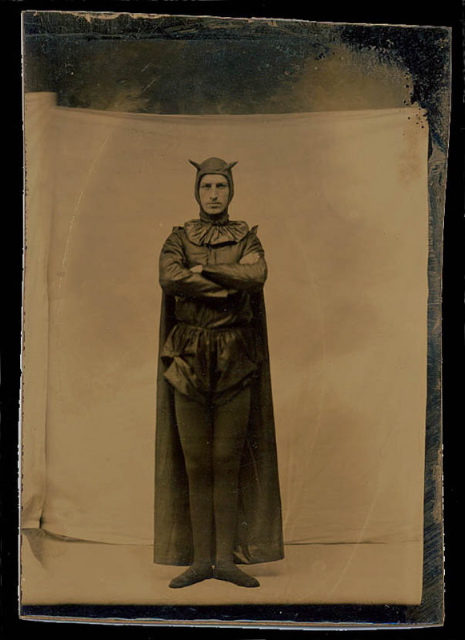Reports reach me of dismal doings at the Pointy Town Tourist Board. In an attempt to drum up visitor numbers, a faction on the Board is engaged in not just the rewriting of history, but its wholesale invention. The latest brochure invites me, and thousands like me, to take part in the so-called Pointy Town Pilgrimage Trail, experiencing “the sights and sounds and tastes and smells that greeted those ancient wayfarers who embarked upon the Pilgrimage to Pointy Town in days of yoreâ€. This is shameless twaddle. In the ancient days to which the brochure refers, Pointy Town itself did not exist. All a wayfarer of yore would have found was an area of curiously pointy ground, with a few ponds on which ancient ducks and swans clamoured. It is true that the pointiness of the land led later to the erection of a town, but in ancient days there were not even any wattle-and-daub dwellings there, and the area has no caves to speak of in which ancestral Pointy Towners could have sheltered from the filthy weather.
The Tourist Board wants us to believe, if I am interpreting the illustrations correctly, that thousands of years ago saucy pilgrims with terrific hairstyles fetched up in Pointy Town from all over the land, and even from lands beyond, and celebrated the general pointiness of things by holding strange ancient ceremonies, traces of which can be found today. For example, there is a gaping pit around the corner from the present post office, and this is meant to be evidence not of botched contemporary roadworks but of a rite involving herons and vipers and bees and hairy men. Where all these herons and vipers and bees and hairy men are meant to have come from, and how they gathered around the pit, and what they did once there gathered, is all left a bit vague. As, to be frank, is the claim that the post office itself stands on the site of the Pointy Town Thing, an ancient parliament on the Icelandic model, and predating the Icelanders’ own Thing by a good few centuries. I am assured that next time I lick the reverse of a postage stamp at the post office counter, I am doing so at the very spot where an ancient Pointy Towner named Anaxacaractagrax proclaimed The Brimmings, whatever they are meant to be. This same Anaxacaractagrax is supposedly related, how we are not told, to Atossa, the imperious mother of Xerxes, which gets the Tourist Board into all sorts of chronological and geographical knots.
Indeed, there are so many knots, vagaries, and plain implausibilities in this invented history that only a fool would be taken in. That being so, it has to be said that there are plenty of foolish people around, for the Pointy Town Pilgrimage Trail is proving to be a thunderous success. Last week I decided to hie over there for the first time in years to see what was going on. I didn’t bother taking the brochure with me, for I had dropped it into a puddle and it was not yet dry. I wore galoshes and the hat of a peasant for my trip, and rather overdid breakfast in the dining carriage of the pneumatic railway train which wheezed, with many spluttering halts, through the horrible countryside towards Pointy Town, the pointy bits of which were visible long before we finally hissed into the station. Having memorised the tourist brochure as best I could, I was aware that the station was part of the pilgrimage trail. It was here, apparently, that the counting of birds took place, the tally posted on a flag hoisted high. What numeric system was used, what material the flag was woven from, and with what instrument the flag was marked: none of this was made clear. Those ancient folk may have had a sort of hemp, but we know for a fact that they had no ink. And, in any case, how did they get all the birds to stand still and be counted? I was already thoroughly exasperated as I made my way to the station canteen for one last plate of sausages and treacle and a bowl of cornflakes and a beaker of tea. Imagine my disgust when I saw that the beaker was stamped with a pilgrimage emblem, and an accompanying leaflet informed me that it was a reproduction of the beakers used by Pointy Town Pilgrims at celebratory feasts on the eve of the Docking Hack.
My temper did not improve as I lumbered slowly into town. There seemed to be not a single street, building, lamp-post or duckpond that had not been hijacked by the Tourist Board for its counterfeit history. Even when I popped into a snackbar for elevenses I could not escape. Sitting down to a hearty pan of pig haunches and suet, I was joined immediately by a local person sporting the hat of an indigent, who barely took time to introduce himself before regaling me with his theory that the ancient Pointy Town pilgrims were not freeborn men and women, but abductees, yoked together like farmyard creatures, driven to the town by brutish captors for purposes we modern sophisticates could only guess at. He had drawings, of course, which he took from an inner pocket of indescribable grubbiness and spread out on the snackbar table, almost knocking over my tumbler of fermenting berry slops as he did so. He talked me through each drawing with some excitement, explaining that the sketches had come to him in fits of entranced lucidity. I was not surprised to see spaceships patrolling the sky in about half of these scribbles, but, curiously, he made no reference to them in his babble. He was insistent that I go along with him to see one of the most pointy bits of Pointy Town, where, he promised, he would show me incontrovertible evidence of his abduction theory in the form of fragments of yoke and chain embedded in ancient shards of bitumen. But I was having none of it. When I had finished my snack, I knocked his hat off his head and swept his drawings off the table, stamping them into the floor as I left.
Back on the street, I checked my bearings by the eerie late morning light and headed towards the town centre, where I wanted to visit the Tourist Board Office. No one, it seemed, was willing to call into question the falsification of Pointy Town history. Emboldened by my breakfasts and elevenses, I determined to give the liars a piece of my mind. It was unlikely that, single-handed, I could dismantle the rash of ahistorical poop engulfing what had been my favourite town, but at least my spleen would be vented, as spleens require venting, preferably after a good lunch. As I pranced alongside the graveyard wall, I reflected on the disservice these bumptious numbskulls were doing to the true heroes of Pointy Town past, men like Ferenc Puskas, the legendary Hungarian football ace, who though he had no connection with the place whatsoever, and indeed had never even heard of Pointy Town, let alone ever visited it in life, was nonetheless a numinous presence in every park and garden and patch of mud, at least as far as I was concerned. It mattered not to me that the Pointy Towners themselves were blind to his ethereal dash and verve. Puskas, for me, was as much a presiding spirit of Pointy Town as was the medieval chieftain Bruno La Poubelle, who laid out the winding pathways of the old town, planted the grassy knoll, built the pergola and the schoolbook depository, and made some of the pointy bits even pointier than nature intended. But where was La Poubelle to be found in this new dispensation? It looked to me as if the Tourist Board had erased him, and it was with a sick heart and a sick brain that I crashed into the Café Spigot, next door to the Tourist Board Office, to have my lunch.
Tucking into a gigantic helping of jugged hare, lobster and branflakes, I rehearsed the uninvited lecture I planned to give to the wretched begetters of the Pilgrimage Trail. I was assuming that they would all be there, next door, skulking about, inventing fresh idiocies, counting the cash they had fleeced from the ignorant. Only during the cheese, sponge and nuts course did it occur to me that today was a public holiday, and the office was likely to be shut. Yet by now I felt impelled to make the lying gits feel the lash of my tongue. I would uphold the glory of the ghosts of Puskas and La Poubelle and dash their pasteboard chaff aside, or squash it underfoot, or crumple it in the palm of my hand, or whatever one does with chaff in Pointy Town. As I took dainty sips from my post-prandial cuppasoup, I remembered that Pebblehead had written a bestselling paperback called A Basic Survey Of Methods Of Pasteboard Chaff Disposal In Pointy Town, and resolved to break and enter the library to consult a copy. Armed with Pebblehead’s techniques, perhaps I could destroy the heritage horrors disfiguring the town and enwrap it once again in the protective blankets of La Poubelle and Puskas.
The library was out beyond the seven tiny warehouses and the fairground, which meant that I had to negotiate my way past the doll hospital, the most frightening place in Pointy Town. Ever since I had first visited it, decades ago, as an ambitious cub reporter sniffing out a story of gruesomeness, treachery, and doll-related frightfulness, it had been the locus of my nightmares. I never did write up the story, and resigned from the Pointy Town Herald & Thunderclap soon afterwards. Thus began my long exile from the town of my birth, my estrangement from all I held dear. The intervening decades have been hard on me, but as I swept along Midge Ure Boulevard I realised that time has been harder on the town itself. All I had cherished seemed to be either vanished or in decay, and even the pointy bits on the approach to the warehouses seemed blunter and less pointy. Was the Tourist Board solely responsible for the ruin, or were there other, wider, more sinister forces at work? I pulled my windcheater tighter around my torso and popped into a roadside tea room for a mug of tea and a jumbo packet of arrowroot biscuits.
The tea room, I learned, was annexed to the Pointy Town badger sanctuary, and imposed a surcharge on each biscuit sold to fund its badger work. Admirable as this initiative was, it made for a tremendously expensive snack, and I began to worry that I would not have cash enough in my pippy bag to afford supper before catching the train home. I also needed to drop into an ironmongery to buy, or rent, the tools necessary to effect my breaking into the library. I was counting out my remaining coins on the tea room’s formica tabletop when a moustachioed old timer sidled over to me. He wore the hat of an ingrate, and gave off a distinct aura of bitter gall. I was in no mood for another snackbar conversation with a conspiracy theorist, so without a word I turfed the oldster’s hat from his head, scooped my coinage back into my pippy bag, and made for the door.
I was halfway towards the ironmongery merchant when I realised that the elderly ingrate, now hatless, was following me, but making no attempt to catch up. I stopped, and he stopped too. I took one pace forward, and he took two. This was because I have a long, loping stride, whereas my pursuer took more cautious, rickety steps. I was surprised he did not topple over. Using binoculars, I scanned his face, to which I had paid little attention in the tea room. So bushy and magnificent was his moustache that it was difficult to see beyond it, but it struck me that there was something familiar about him. He tugged at a corner of my memory, but I could not yet place him. Tucking the binoculars back into their pouch, I walked on, occasionally checking to see if he still trailed me, and he did.
The afternoon sun blazed high in the sky as I reached the spot near the municipal flowerbeds where I expected to find the ironmongery. Many, many years had passed since last I was in Pointy Town, but I hardly expected to find this landmark emporium gone. It was, after all, the most inspiring ironmongery in the whole province, a magnet for bolt-cutting enthusiasts near and far. Yet no trace of it survived. In its place stood a plinth atop which was a hideous cement statue of a saucy pilgrim with a terrific hairstyle, holding a cement placard announcing that this was the end of the Pointy Town Pilgrim Trail. It was ugly, it was spurious, and a magnificent ironmongery shop had been bulldozed by the philistines on the Tourist Board to make way for it. I was livid. I was also dashed in my plan to buy, or rent, tools with which to jemmy the lock on the library door. What now?
I leaned against the railings surrounding the plinth and took from my pocket a bag of brisket and toffee. Munching on these would steady my nerves, and allow me time to think. Just as I bit off a mouthful of brisket, I was overcome by an aura of bitter gall, and the ingrate who had been tailing me suddenly materialised at my side, in a manner I was unable to comprehend and cannot describe. He simply stood there, lugubrious and mournful, with flies circling his hatless head. He was close enough that I had no need of binoculars to examine his face, and I forced my eyes to peer behind the moustache, trying to recall where I had seen him before.
I grew up in Pointy Town, and had an idyllic childhood. I remember tents and swans and dramatic hiking incidents. I remember flag days and sing-songs and buying my first, child-sized, bolt-cutters and other ironmongery items. I remember toads and pastries and gutta percha. I remember hearing the name Ferenc Puskas on the radio, and the sound of thousands cheering. And I remember lolloping home from the library clutching my favourite book, A Lavishly Illustrated History Of Pointy Town For Pointy Town Tinies. And I remember the frontispiece of the book, a mezzotint by the mezzotintist Rex Tint of the medieval Pointy Town chieftain Bruno La Poubelle, with his fantastically bushy moustache. He it was – or his wraith – who stood beside me now. No wonder he was engulfed in an aura of bitter gall, witnessing the desecration of the town he raised from a patch of pointy ground. I gaped at him, pop-eyed, nearly choking on my brisket. Then the sky, so sunny a moment ago, was plunged into an uncanny blackness, and I felt La Poubelle’s hands upon my shoulders, shrivelled yet firm, and I felt the rustle of his mighty moustache upon my forehead, and then I, too, was enveloped in his aura of bitter gall. But I felt most intensely an ennoblement of my spirit, and a startled recognition that with the potency of my brain alone I could smash to smithereens every vile Tourist Board Pilgrimage Trail bubo throbbing with venom in the Pointy Town I loved. I could obliterate them in an instant, if I wished. The blackness evaporated, the sun blazed again as it always did on this blessed town, and I dipped my hand into my bag of brisket and toffee, ready to offer a bite to Bruno La Poubelle. But the apparition had vanished. I was alone by the railings, beneath the cement statue of the spurious saucy pilgrim with the terrific hairstyle. I had the power to dash it to dust. How would I choose?
I retraced my steps to the town centre, beaming as I passed the ducks and swans clamouring on the pond and tipping my peasant’s hat to the demonstrators from Gorgeous George Galloway’s Respect Party who were marching against something or other, or in favour of something else. A beetle-browed university lecturer dodged out of the demo and pressed a shoddy newspaper upon me, so I tested out my new powers by swatting him aside merely by raising an eyebrow. I was pleased to note that as he hurtled over the horizon at inhuman speed, his pile of newspapers burst into flames. I went back to the Café Spigot and ordered a dish of bloaters and spam and goose grease and fudge sundae, and as I sat waiting, I decided that I would let the evening train leave without me. I had come back to Pointy Town, and now I had work to do.





